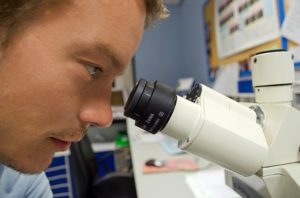- Calls to this hotline are currently being directed to Within Health, Fay or Eating Disorder Solutions
- Representatives are standing by 24/7 to help answer your questions
- All calls are confidential and HIPAA compliant
- There is no obligation or cost to call
- Eating Disorder Hope does not receive any commissions or fees dependent upon which provider you select
- Additional treatment providers are located on our directory or samhsa.gov
Genetic Risk Factors Connected to Binge Eating Disorder

New research findings, which were recently published in the journal of Biological Psychiatry, have uncovered more information about the genetic influences involved in binge eating disorder.
In a study conducted at the Boston University School of Medicine, researchers have identified a specific gene in mice associated with binge eating. While binge eating disorder has been known to have a variety of influencing factors, both biological and environmental, the exact underlying genetic factors have been unknown.
Binge eating behaviors have been understood as highly heritable, associated with both substance use disorders and eating disorders [1].
Uncovering Genetic Links
In this particular study, researchers utilized technological developments, such as whole genome sequencing, to assist with mapping out genetic risk factors for addiction.
Scientists used two strains of mice that were genetically similar, breeding the strains with one another for two generations. This method allowed researchers the opportunity to identify any links between behavioral variations and genetic inheritance [1]. Through these efforts, researchers found a link between binge eating and a mutation in the gene known as cytoplasmic FMR1-interacting protein 2, or CYFIP2 [1].
Scientists also discovered that the behaviors characteristic of binge eating disorder are possibly connected with a decrease in the transcription of genes needed for myelination, which is the process responsible for the formation of a sheath protection around nerve fibers. Myelination is needed for speeding the flow of nerve impulses across nerve fibers in the body.
Researchers are interested in learning if the restoration of myelin could result in normalized eating behaviors in individuals who have struggled with binge eating disorder.
The Future of Research
 On the discoveries from this study, Camron Bryant, assistant professor of pharmacology and psychiatry, noted, “These are exciting times for the genetics of eating disorders and the addictions. We’re at the stage where it’s really about to take off in terms of new discoveries.” Bryant has indicated that future research studies will assess if remyelination and the attempt to restore neuronal function may help reverse behaviors connected with binge eating.
On the discoveries from this study, Camron Bryant, assistant professor of pharmacology and psychiatry, noted, “These are exciting times for the genetics of eating disorders and the addictions. We’re at the stage where it’s really about to take off in terms of new discoveries.” Bryant has indicated that future research studies will assess if remyelination and the attempt to restore neuronal function may help reverse behaviors connected with binge eating.
These findings are not only helpful for improving therapeutic approaches for binge eating disorder, but also in validating and reinforcing the genetic/biological component of this multifaceted eating disorder.
Sadly, many individuals who struggle with this disease do so under enormous stigma about a condition that is widely misunderstood. Genetic findings such as these can help develop possible neuropsychiatric approaches for the complex condition of binge eating disorder.
 About the Author: Crystal is a Masters-level Registered Dietitian Nutritionist (RDN) with a specialty focus in eating disorders, maternal/child health and wellness, and intuitive eating. Combining clinical experience with a love of social media and writing, Crystal serves as the Director of Content and Social Media for Eating Disorder Hope/Addiction Hope, where her passion to help others find recovery and healing is integrated into each part of her work.
About the Author: Crystal is a Masters-level Registered Dietitian Nutritionist (RDN) with a specialty focus in eating disorders, maternal/child health and wellness, and intuitive eating. Combining clinical experience with a love of social media and writing, Crystal serves as the Director of Content and Social Media for Eating Disorder Hope/Addiction Hope, where her passion to help others find recovery and healing is integrated into each part of her work.
As a Certified Intuitive Eating Counselor, Crystal has dedicated her career to helping others establish a healthy relationship with food and body through her work with EDH/AH and nutrition private practice.
References:
[1]: Cytoplasmic FMR1-Interacting Protein 2 Is a Major Genetic Factor Underlying Binge Eating. Kirkpatrick, Stacey L. et al. Biological Psychiatry , Volume 81 , Issue 9 , 757 – 769The opinions and views of our guest contributors are shared to provide a broad perspective of eating disorders. These are not necessarily the views of Eating Disorder Hope, but an effort to offer discussion of various issues by different concerned individuals.
We at Eating Disorder Hope understand that eating disorders result from a combination of environmental and genetic factors. If you or a loved one are suffering from an eating disorder, please know that there is hope for you, and seek immediate professional help.
Published on May 12, 2017.
Reviewed By: Jacquelyn Ekern, MS, LPC on May 12, 2017.
Published on EatingDisorderHope.com

The EatingDisorderHope.com editorial team comprises experienced writers, editors, and medical reviewers specializing in eating disorders, treatment, and mental and behavioral health.

